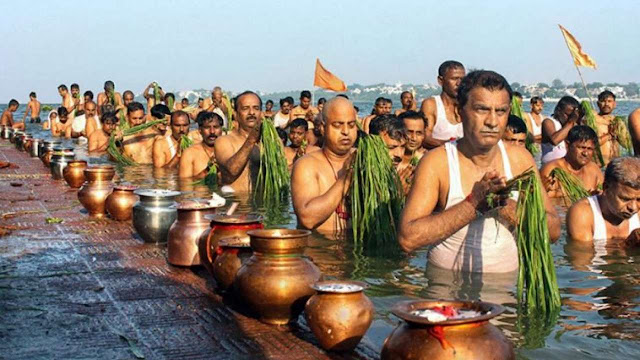Pitru paksha homage to ancestors
through food and water offerings in the form of pinda pradhana and tarpana.
Duration of the pitru paksha is 16 lunar days in the lunar month of
Bhadrapada/Ashwayuja as per the Hindu calendar. People from the south and west
India follow this in the lunar month of Bhadrapada and people from the north
follow this in the month of Ashwayuja. It begins with the full moon day or a
day after the full moon day and ends on Mahalyaya Amavasya. Pitru paksha shraaddha
has different names depending upon the region and language.
The story
Great and gallant Karna was served
with gold and golden plates in Pitru-Loka. Karna did not offer food and water
to his ancestors during his life span on the earth planet. Due to this, he was
served gold in Pitru-Loka. Karna requests Devendra and Deva Devendra allows
Karna to offer food and water to his ancestors for 15 days on the earth planet.
This happens to be Bhadrapada lunar month. Hence it is called pitru paksha.
Yamraj is the head of the Pitru-Loka. He liberates ancestors during pitru
paksha to accept offerings from their descendants.
Importance of Pitru Paksha
According to Hindu scriptures,
there are three debts called Dev, Rishi, and Pitru debts. People offer food and
water to fulfill their ancestors who come to the earth planet during pitru
paksha. As a tribute and tradition, people perform pitrukarya in pitru paksha and followed by Devata karyas after pitru paksha. When we follow this order one
will get good results from Devata pujas. Pitrus bestow Santana (generation),
Santrupti (happiness), and Sampath (wealth).
This pitru paksha shraaddha is also known in different names depending upon the region and language.
The scripture Garuda Purana says, "there is no salvation for a man without a son". The scriptures preach that a householder should propitiate ancestors (Pitrus), along with the gods (devas), elements (bhutas) and guests. The scripture Markandeya Purana says that if the ancestors are content with the shraaddhas, they will bestow health, wealth, knowledge and longevity, and ultimately heaven and salvation (moksha) upon the performer.
